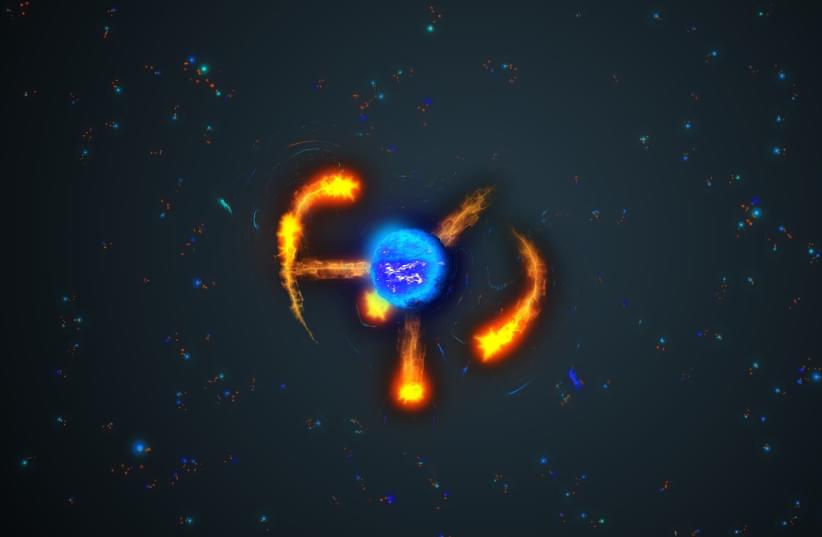“There’s a lot of cheap knowledge out there. I think this could be a danger in education, and it’s not good for kids,” said one educator of OpenAI’s viral chatbot.


Don’t worry, human drummers. It won’t take your job.
One of the best qualities of talented drummers is to be able to show all their dexterity by staying in the metronome beats. Xiaomi should be aware of this because the humanoid bot it produces is on its way to becoming a rock star.
Chinese consumer electronics company Xiaomi introduced CyberOne in August and shared a fresh video of it playing drums. Slow for now, but it can stay on the beat.
It is able to accurately coordinate a variety of intricate movements, such as slapping the drumsticks together, tapping the cymbals, using the foot pedal, and using a set of four drums to produce a variety of sounds.
The ultralight solar cells are made of semiconducting inks using printing processes that can be scaled in the future to large-area manufacturing.
A group of engineers at MIT have developed a rather interesting solution to be deployed in remote locations or for assistance in emergencies: solar cells made of ultralight fabric that can turn any surface into a power source.
The research is published in Small Methods.
Melanie Gonick, MIT
Thinner than human hair, the durable, flexible solar cells are stuck on a strong, lightweight fabric that makes them very easy to affix to a surface, just like a sticker.
Would you want to take one home if it freed you up from the hassles of pregnancy?
The concept of the world’s first-ever artificial womb facility has been unveiled. Called EctoLife, the facility can produce up to 30,000 babies every year. The use of the word “produce” is deliberate since, as one can see in the video below, the facility aims to give parents a wide range of tools to get a baby customized to their desires.
Hashem Al-Ghaili/ YouTube.
The concept and need for such a facility are pretty clear. The global human population is now reaching its peak and is expected to fall from here. The world’s richest person, Elon Musk, has been vocal about this and, by fathering nine children so far, believes he is doing his best to prevent the world from suffering a population collapse.

For the first time ever, US scientists at the National Ignition Facility at the Lawrence Livermore National Laboratory in California successfully produced a nuclear fusion reaction resulting in a net energy gain, a source familiar with the project confirmed to CNN.
The US Department of Energy is expected to officially announce the breakthrough Tuesday.
The result of the experiment would be a massive step in a decadeslong quest to unleash an infinite source of clean energy that could help end dependence on fossil fuels. Researchers for decades have attempted to recreate nuclear fusion – replicating the fusion that powers the sun.
Using a chip-based optical frequency comb, researchers transmitted almost double the global internet traffic in a single second.

The US government may have made a major scientific breakthrough in fusion energy, paving the way for creating a limitless supply of energy with zero carbon emissions or radioactive waste, The Financial Times reported, citing people with knowledge of a recent experiment’s results.
The fusion process is a landmark step of progress in the quest to achieve a limitless supply of environmentally-friendly energy.
According to The Financial Times, the US Energy Department will have US Energy Secretary Jennifer Granholm and Undersecretary for Nuclear Security Jill Hruby announce a “major scientific breakthrough” sometime on Tuesday.

Playing through the greenery and litter of a mini forest’s undergrowth for just one month may be enough to change a child’s immune system, according to an experiment in Finland.
When daycare workers rolled out a lawn, planted forest undergrowth (such as dwarf heather and blueberries), and allowed children to care for crops in planter boxes, the diversity of microbes in the guts and on the skin of the young kids appeared healthier in a very short space of time.
Compared to other city kids who play in standard urban daycares with yards of pavement, tile, and gravel, 3-, 4-, and 5-year-olds at these greened-up daycare centers in Finland showed increased T-cells and other important immune markers in their blood within 28 days.

Mayo Clinic researchers found a noncellular substance suggested improvement in restoring muscle function and bladder control in preclinical models. The teams of Atta Behfar, M.D., Ph.D. and Emanuel Trabuco, M.D., led this research in a collaboration between Mayo Clinic Departments of Cardiovascular Medicine and Obstetrics and Gynecology. The paper is published in NPJ Regenerative Medicine.
“Surgical treatment for stress urinary incontinence, a condition afflicting 25 million women, has significantly declined over concerns about negative side effects,” says Dr. Trabuco. “This has led many women to delay therapy and suffer needlessly. We hope to develop a minimally invasive, noncellular, exosome-based approach to muscle regeneration for urinary incontinence that not only targets the underlying cause of the condition but also avoids the problem with invasive surgical options presently available.”
The research team used regenerative purified exosome product, known as PEP, derived from platelets to deliver messages into the cells of preclinical models. Exosomes are extracellular vesicles that are like a delivery service moving cargo from one cell to another, with instructions for targeting exact tissues that need repair. The study suggests that the use of purified exosome product alleviates stress urinary incontinence from musculoskeletal breakdown in animals. The team did not detect any infection or off-target toxicity with application of PEP.
For any issue please contact us at 👇🏻
[email protected] : https://www.facebook.com/ttienglish007
Instagram : https://www.instagram.com/top_10_information/
Twitter : https://twitter.com/tti_english.
# Ultra Hydrobhobic Material (Gentoo)
Gentoo is the next generation of corrosion-resistant and easy-cleaning coatings. With its combination of high performing abrasion resistance and very low sliding angle, Gentoo excels where other coatings have fallen short https://goo.gl/LgBgXL
https://goo.gl/vcfXEd.
https://goo.gl/n8yzDV
https://goo.gl/rGUikJ# Triiodide.
n chemistry, triiodide is usually referred to the triiodide ion, I−
3. This anion, one of the polyhalogen ions, is composed of three iodine atoms. It is formed by combining aqueous solutions of iodide salts and iodine.
https://en.wikipedia.org/wiki/Triiodide.
https://goo.gl/AVfLSk.
https://goo.gl/dFnZSu.
https://goo.gl/X7fgnL
https://goo.gl/t3nYZd.
https://goo.gl/xEJXeb# Hydrogel.
Hydrogel products constitute a group of polymeric materials, the hydrophilic structure of which renders them capable of holding large amounts of water in their three-dimensional networks. Extensive employment of these products in a number of industrial and environmental areas of application is considered to be of prime importance.
https://goo.gl/T85Nkj.
https://en.wikipedia.org/wiki/Gel.
https://goo.gl/SQj5zg.
https://goo.gl/gTmWe3
https://goo.gl/i99LTk.
https://goo.gl/BfVgKN# Nitinol.
Nitinol alloys exhibit two closely related and unique properties: shape memory effect (SME) and superelasticity (SE; also called pseudoelasticity, PE). Shape memory is the ability of nitinol to undergo deformation at one temperature, then recover its original, undeformed shape upon heating above its “transformation temperature”.
https://en.wikipedia.org/wiki/Nickel_titanium.
https://goo.gl/mtFu8S
https://goo.gl/kdUshM
https://goo.gl/ncXF3X
https://goo.gl/sbnvtY
https://goo.gl/Uc3pdX
https://goo.gl/V3DWEx# Gallium metal.
https://goo.gl/2jv7P1
https://goo.gl/B8KMqf.
https://goo.gl/1Lsk9n.
https://goo.gl/YPfRzH
https://goo.gl/6Td8Q4
https://goo.gl/va94iV# Aerogel.
https://goo.gl/Wq69zr.
https://goo.gl/6ag7zV
https://goo.gl/2LAJSy.
https://goo.gl/Z5BV5g.
https://goo.gl/hw8m81
https://goo.gl/hVqBz1# Magnetic Thinking Putty!
https://goo.gl/Pvos7a.
https://goo.gl/1Tg8Cg.
https://goo.gl/zTHbwJ
https://goo.gl/TSrQSN
https://goo.gl/W37Wyh.
https://goo.gl/4C1avx.
special Credits:
CrazyRussianHacker.
https://www.youtube.com/user/CrazyRussianHackerGrant
Thompson — “The King of Random“
https://www.youtube.com/user/010320108141-FerroFluid.
https://goo.gl/TpSZLc.
https://goo.gl/SF7qh9
https://goo.gl/65uTND
https://goo.gl/ze9GR4
https://goo.gl/Fe2Wdy.
https://goo.gl/pXQkd42-Liquid Nitrogen.
https://goo.gl/Xj4sEM
https://goo.gl/d5Go3j.
https://goo.gl/fBtdHC
https://goo.gl/xnuFNR
https://goo.gl/jmYgrj.
https://goo.gl/tQZZ4C
https://goo.gl/vHwdPE
3-Dry Ice.
https://goo.gl/7W3Cjh.
https://goo.gl/7QF8kB
https://goo.gl/uX8KdL
https://goo.gl/rmTpXs.
https://goo.gl/nvoXgf.
https://goo.gl/Mz2EBH
https://goo.gl/ndB7Rn.
https://goo.gl/ZCBxmE
https://goo.gl/4GnrsM
https://goo.gl/VQjNCX
https://goo.gl/LJXgoR
https://goo.gl/CyHL5E
https://goo.gl/reB3cN4-Black Fire Snake.
https://goo.gl/xNUJgz.
https://goo.gl/zSAjY2
https://goo.gl/eWCFp7
https://goo.gl/w7mafY
https://goo.gl/jYGWZT
https://goo.gl/LgUgqD
https://goo.gl/N24pV3
https://goo.gl/zeQaRn.
https://goo.gl/g3wpTX5-Magical Fire.
https://goo.gl/hdyMVL
https://goo.gl/mh1FUK
https://goo.gl/vJ9N8A
https://goo.gl/C1Emto.
https://goo.gl/pZvwvL6-Sodium Metal.
https://goo.gl/LLmqfe.
https://goo.gl/nQG2Vv.
https://goo.gl/K3KfGC
https://goo.gl/ooLwyP
https://goo.gl/Asxu3t.
https://goo.gl/G8cu2g.
https://goo.gl/CGBemZ
https://goo.gl/pgUi2Y7-Burning calories (Sugar)
https://goo.gl/ch9ihk.
https://goo.gl/MNRTnC
https://goo.gl/qeRQcW
https://goo.gl/fCaLZm.
https://goo.gl/tV7Xie.
https://goo.gl/2e3kjF
https://goo.gl/7WLYte.
https://goo.gl/Q4uirf.
8-Elephant Toothpaste.
https://goo.gl/zHTN2i.
https://goo.gl/GJm168
https://goo.gl/Tm71ej.
https://goo.gl/Hv6Ng3
https://goo.gl/vdbKbU
https://goo.gl/wB6P5Y
https://goo.gl/Ez4Gyg.
https://goo.gl/xkwyJL9-The Litracon.
https://goo.gl/gjR8oj.
https://goo.gl/8tn2vd.
https://goo.gl/viBNP2
https://goo.gl/wqxZMY
https://goo.gl/a3f9PD
https://goo.gl/yQvW4S10-The Neodymium.
https://goo.gl/D9RPnq.
https://goo.gl/3Vccem.
https://goo.gl/dvWgHk.
https://goo.gl/8yvA4d.
https://goo.gl/6HKRPj.
https://goo.gl/HsqgS4
https://goo.gl/s3NjZL
https://goo.gl/Jia5hs.
https://goo.gl/ALVFzB
https://goo.gl/kzjVCg.
https://goo.gl/3LHzd5
https://goo.gl/KnrTg3
https://goo.gl/uQWwg8
#experiment #material #science